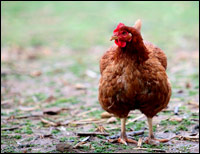Dear Umbra,
I just read your column on organic syrup, and you made a comment about the futileness of the phrase “free range.” I always try to buy free-range eggs and, whenever possible, the same with chicken. Am I wasting my money?
Jeff Pritts
St. Louis, Mo.
Dearest Jeff,
Yes, basically. There is a chance that your egg purveyor uses “free range” in the way that you understand it, but the only way to tell is call them and ask about range freedom on their chicken ranch. The Food and Drug Administration oversees “shell eggs” (jargon of the week), but I can’t find any indication that they oversee free-range labeling. If you’re buying free-range eggs, either the producers are ranging the chickens free on their own terms, or they are scamming you.

Darn the cluck.
Photo: iStockphoto.
The U.S. Department of Agriculture does regulate the term “free range” for poultry. As you can see on the Food Safety and Inspection Service website, “producers must demonstrate to the agency that the poultry has been allowed access to the outside” in order to use the free-range label. According to the USDA, producers must provide data and evidence showing the chickens have true access, not just an open door for 45 minutes a week or something. Although there are no regular field inspections, the fellow I spoke with at USDA says there are certainly periodic occasions for checking up on chicken farms, partially because neighbors report cheaters. Who knew?
It would be interesting to poll the general eco-consumer and learn what the fantasy of “free range” is, but you can see from the standard that free-range chickens certainly do not live outdoors. Your chicken dinner may never once go outside, unless you barbecue it. (On the brighter side, that particular chicken might not have cared.) If you would like to learn about the rest of the eco-labels for which you pay premium, Consumers Union keeps a website for just that purpose.
I’d like to forestall you getting too worked up over the misleading “free range” label. It is a pity, certainly, and we should clear up this shell-egg confusion, and chickens should lead happy lives. But until the Revolution comes, the only way to assure your food is raised the way you would like it to be raised is to know the producer or be the producer.
The cold hard facts of industrial meat production are never going to conform to any fantasy of industrial free-range chicken. Almost all meat birds today are Cornish Cross broilers, a hybrid chicken bred for rapid weight gain, efficient feed conversion, ease of plucking, uniformity of growth, and machine processing. Cornish Cross reach market weight in six or seven weeks; at this point they are too heavy for their legs and sometimes cannot even walk to whatever range is available. They are raised in large-scale production operations increasingly run by corporate managers and staffed by well-meaning farmers stuck in a terrible contract system, not unlike indentured servitude.
This is our food system. It’s terrible for the humans who run it and terrible for animals. Buying free-range birds doesn’t get us around our participation. Know your producer or go veggie. Sorry.
Albumenly,
Umbra

